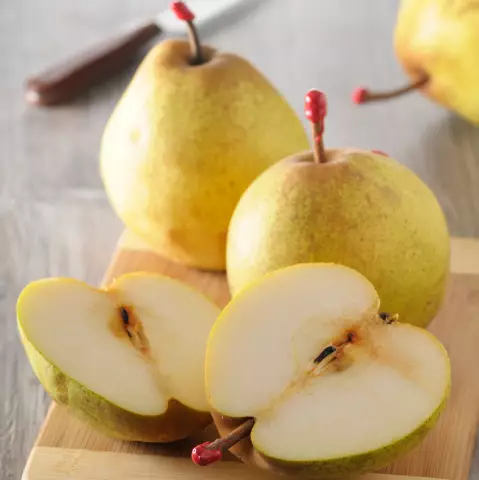- Author Rachel Wainwright wainwright@abchealthonline.com.
- Public 2023-12-15 07:39.
- Last modified 2025-11-02 20:14.
10 foods to relieve constipation

Among the many pathologies to which a person has become susceptible, more and more moving away from the natural way of life, constipation is in the first place. Constipation is not a disease, but rather a pathological condition, but if you do not take measures to eliminate it, then it becomes chronic, and this is already a direct path to disease.
The fact is that a person's immunity directly depends on the state of the intestine, and if this condition is deplorable, then the body's resistance to disease is sharply reduced. In addition, chronic constipation over time leads to diseases of the intestine itself. So, oncologists associate the constant increase in the incidence of colon cancer among residents of countries with developed economies precisely by the fact that it is in these countries that people are most susceptible to constipation. Why? Due to inaccuracies in nutrition, namely due to the prevalence of refined, thermally processed food.
We offer you the top 10 products that, if consumed regularly, are guaranteed to relieve constipation.
1. Water
And it's not a joke. Chronic dehydration is one of the most common causes of constipation. Dense, dry feces with difficulty move through the intestines, in addition, with a constant lack of water, the intestine becomes atonic, sluggish, its peristalsis is reduced. This forms fecal congestion, in other words, constipation. To prevent it, you need to drink enough clean water every day. It is simple to calculate this amount: 1 kg of body weight should have at least 25 ml of water per day. Thus, a person weighing 65 kg needs to drink a little more than one and a half liters of water daily - isn't that an inexpensive laxative?
2. Prunes
A person suffering from constipation is recommended to eat 100-150 g of prunes daily. This is a truly reliable remedy, mild action, tasty and, moreover, useful, since prunes contain a lot of substances necessary for the body. It is better to use prunes as a cure for constipation in their pure form, without soaking, without boiling, without sugar and other additives.
3. Bran
The bran is the shell of the grain that is removed during processing. In an effort to improve the taste and appearance of flour products, people began to remove the tough shell of the grain, and then it turned out that without it, white bread and rolls, although they look tastier and more attractive, are almost the main constipation-forming product. For people with intestinal atony, products made from refined flour are contraindicated. You can buy bran bread, or you can purchase bran separately, which are sold in the dietary departments of large grocery stores, and add a little to food: in baked goods, salads, soups.
4. Cabbage
Fresh cabbage, like bran, contains a large amount of fiber, otherwise called cellulose. Fiber is not digested in the body, but it enhances intestinal motility and the movement of the food lump through it. An excellent laxative is a cabbage-based salad with the telling name "Broom". In addition to the cabbage itself, it also contains fresh carrots and beets. Chop these vegetables in any ratio, season with a spoonful of sunflower oil and salt - and you have an exceptionally healthy, tasty salad that will relieve you of constipation.
5. Apples
Apples, in addition to cellulose, contain a substance that has a beneficial effect on intestinal function and promotes the removal of toxins outside - pectin. Treatises have been written about the benefits of apples, and not the last place in the list of healing properties of these fruits is the urge to cleanse the intestines. A popular English proverb says: "An apple for dinner, and a doctor is not needed," thus clearly hinting at just this property.
6. Kefir and natural yogurt
Fermented milk products, especially kefir and / or natural yogurt, must be included in the diet of people prone to constipation. These products are classified as prebiotics - substances that contribute to the vital activity of the correct intestinal microflora. A healthy microflora supports normal bowel function, including timely and easy disposal of waste. The most important condition for effectiveness is the naturalness of the product, since “dead” fermented milk products with a long shelf life are deprived of these advantages.
7. Coffee
Oddly enough, but coffee, with which nutritionists sometimes declare war, is by no means devoid of useful properties, and one of them is the prevention of constipation. The mechanism of action of coffee in this case consists of its ability to tone the body, including the intestines, as well as promote the release of bile from the gallbladder, which, in turn, has a laxative effect. However, it should be borne in mind that the above qualities are valid only for natural freshly brewed coffee.
8. Melon
The laxative properties of melon are so strong that, despite its delicious taste and many useful ingredients, nutritionists advise to consume it in small quantities and preferably as a separate meal, without mixing it with anything. Such a powerful effect is due to the fact that the melon contains both cellulose and pectin, and, like coffee, promotes the discharge of bile.
When fresh melons are out of season, you can get by with dried ones, however, their effect is somewhat weaker.
9. Leafy greens
Leafy greens are very, very good for the gut in the first place. Actually, leafy greens are solid fiber plus minerals. When nutritionists studied Caucasian centenarians, they drew attention to the fact that they eat a lot of greens, and in general, the traditional feast of representatives of the Caucasian peoples is unthinkable without a dish of fresh greens, which is probably why they suffer from constipation much less often. Parsley, dill, basil, cilantro, tarragon, celery leaves and stalks - all of this should be present in the diet every day, and it is in fresh, thermally unprocessed form and in large quantities.

10. Rhubarb
For some reason, this useful plant has been undeservedly forgotten in our kitchen, but it was not always so. Rhubarb stems contain a large amount of nutrients - vitamins, minerals, organic acids, as well as anthraglycosides - compounds that, when ingested, increase intestinal motility. Since ancient times, rhubarb compote has been used as an effective laxative; in order to prevent constipation in children, rhubarb dishes were included in the children's menu.
All of the above products work best when they are used regularly rather than occasionally. This does not mean that you need to take them all at the same time, but one or two of them must be present in the daily diet. In addition to the laxative effect, they all saturate the body with vital substances. Due to their mild effect on the body, they can be used to treat constipation in children, pregnant women and people weakened by the disease, in contrast to medications, they have no side effects.
YouTube video related to the article:
Found a mistake in the text? Select it and press Ctrl + Enter.






